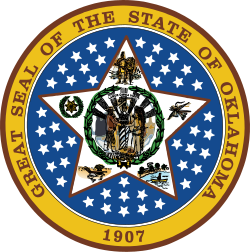| Proposal | Passed | YES votes | YES % | NO votes | NO % | Description |
| State Question 744 |  No No | 189,164 | 18.59 | 828,589 | 81.41 | mandated that the Oklahoma Legislature spend no less than the average amount spent by "neighboring states" (those states which border Oklahoma: Missouri, Texas, Kansas, Arkansas, Colorado and New Mexico) on "common education" (defined as grades pre-kindergarten through high school) on an annual, per-student basis. If the surrounding-state average ever declined, the legislature would be required to spend the same amount as it did the year before. The measure required that increased spending begin in the first fiscal year after its passage and that the surrounding-state average be met in the third fiscal year after passage. |
| State Question 746 |  Yes Yes | 746,053 | 74.34 | 257,523 | 25.66 | requires that each person appearing to vote present a document proving their identity. |
| State Question 747 |  Yes Yes | 695,592 | 69.88 | 299,789 | 30.12 | amend the Oklahoma Constitution by placing term limits on all Statewide elected officials. All officials would be allowed to serve no more two terms in office. Terms served need not be consecutive for the limits to apply. |
| State Question 748 |  Yes Yes | 567,288 | 58.42 | 403,733 | 41.58 | Changes Apportionment Commission's name to the Bipartisan Commission on Legislative Apportionment and would increase the number of members from three to seven. The President pro tempore of the Oklahoma Senate would appoint one Democrat and one Republican, the Speaker of the Oklahoma House of Representatives would appoint one Democrat and one Republican, and the Governor of Oklahoma would appoint one Democrat and one Republican. The Lieutenant Governor of Oklahoma would chair the commission and would be a nonvoting member. It requires orders of redistricting to be signed by at least four members of the commission. |
| State Question 750 |  Yes Yes | 485,703 | 50.40 | 478,042 | 49.60 | changes the number of signatures required for initiative and referendum petitions |
| State Question 751 |  Yes Yes | 740,918 | 75.54 | 239,904 | 24.46 | adding a new Article to the Constitution. That Article would deal with the State's official actions. It dictates the language to be used in taking official State actions must be the English language. However, it allows for Native American languages could also be used and, when Federal law so requires, other languages could also be used. |
| State Question 752 |  Yes Yes | 606,805 | 62.83 | 358,925 | 37.17 | adds two at-large members to the Oklahoma Judicial Nominating Commission. |
| State Question 754 |  No No | 361,907 | 37.08 | 614,219 | 62.92 | amends Constitution to specify that the Constitution could not have required the Oklahoma Legislature to fund state functions based on: Predetermined constitutional formulas, How much other states spend on a function, and How much any entity spends on a function. In opposition to aforementioned SQ744 |
| State Question 755 |  Yes Yes | 695,650 | 70.08 | 296,944 | 29.92 | requires courts to rely solely on federal and state law when deciding cases. It forbids courts from considering or using international law or using Sharia.[1] |
| State Question 756 |  Yes Yes | 638,530 | 64.73 | 347,956 | 35.27 | prohibits making a person participate in a health care system, prohibits making an employer participate in a health care system, and prohibits making a health care provider provide treatment in a health care system. It would allow persons and employees to pay for treatment directly, it would allow a health care provider to accept payment for treatment directly, it would allow the purchase of health care insurance in private health care systems, and it would allow the sale of health insurance in private health care systems. |
| State Question 757 |  Yes Yes | 499,287 | 51.02 | 479,353 | 48.98 | amends Section 23 of Article 10 of the Oklahoma Constitution. It would increase the amount of surplus revenue which goes into the Constitutional Reserve Fund. The amount would go from 10% to 15% of the funds certified as going to the General Revenue fund for the preceding fiscal year. |



 French
French Deutsch
Deutsch